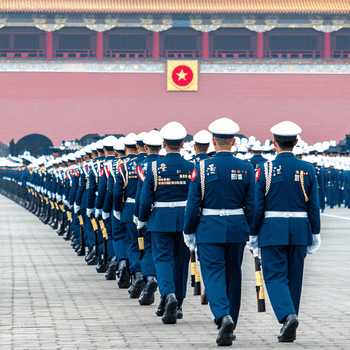
China’s permanent residency system, administered by the Ministry of Public Security (MPS), has evolved significantly in recent years to attract foreign talent and investment.
Understanding the MPS’s role and current requirements is crucial for anyone considering long-term residency in China.
What is China’s Permanent Residency System?
China’s permanent residency, commonly known as the “China Green Card,” grants foreigners the right to live and work in China indefinitely without visa renewals.
The system requires applicants to have good tax payment records and meet specific investment, employment, or family criteria.
Ministry of Public Security: Key Responsibilities
The MPS oversees the entire permanent residency process through several critical functions:
Primary Functions
| Function | Description | Authority Level |
|---|---|---|
| Application Review | Comprehensive evaluation of all documents and eligibility criteria | National |
| Background Verification | Criminal record checks and security clearance | National/International |
| Final Approval | Ultimate decision-making authority for all applications | National |
| Ongoing Compliance | Monitoring residency obligations post-approval | National/Local |
The MPS works closely with local Public Security Bureaus (PSBs) to ensure thorough vetting and ongoing compliance monitoring.
Current Eligibility Requirements (2025)
Investment-Based Permanent Residency
Investment thresholds vary by region, with eastern China requiring USD $2 million minimum investment for three consecutive years, while western regions require USD $500,000.
| Investment Category | Minimum Amount | Requirements |
|---|---|---|
| Eastern China (Major Cities) | USD $2,000,000 | 3 consecutive years, good tax records |
| Central/Western China | USD $500,000 | 3 consecutive years, poverty alleviation areas |
| Strategic Industries | Varies | Based on Catalogue for Foreign Investment Industries |
Employment-Based Categories
Employment-based applicants typically need a minimum annual income of RMB 600,000 (approximately USD $93,000) and must hold senior positions.
Qualifying Positions:
- Deputy General Manager or above
- Deputy Chief Engineer or above
- University professors or associate professors
- Senior researchers in state institutions
Family Reunification
Available for:
- Spouses of Chinese citizens
- Unmarried children under 18 of Chinese citizens or permanent residents
- Elderly parents of Chinese citizens (over 60 with no direct relatives abroad)
Application Process and Timeline
Step-by-Step Process
- Initial Application Submission
- Submit to local PSB Entry-Exit Administration
- Complete document package required
- Biometric data collection
- Local Review Phase
- PSB conducts preliminary review
- Document authentication
- Initial background checks
- MPS Final Review
- Comprehensive security screening
- Financial verification
- Decision within 6 months
- Approval and Card Issuance
- 5-year or 10-year validity (based on age)
- Biometric residence card issued
Required Documents
| Document Type | Details | Validity |
|---|---|---|
| Passport | Original + copies | Current validity |
| Health Certificate | Medical examination from designated hospital | Within 6 months |
| Criminal Record Check | Home country + China (if applicable) | Within 6 months |
| Tax Records | 3 years consecutive | Certified copies |
| Employment/Investment Proof | Contracts, certificates, financial statements | Current |
Compliance Requirements
Permanent residents must stay in China for at least three months per year to maintain their status.
Failure to meet this requirement requires approval from provincial public security authorities.
Key Obligations
- Annual minimum stay: 3 months
- Continued tax compliance
- Address registration updates
- Periodic status reviews
Recent Developments and Trends
Applications increased by 15% in 2024, with Beijing and Shanghai being the most popular destinations.
The MPS has streamlined processes while maintaining strict security standards.
Digital Transformation
The MPS is implementing:
- Online application portals
- Digital document verification
- Biometric integration
- Faster processing times
Benefits of Permanent Residency
| Benefit Category | Specific Advantages |
|---|---|
| Work Rights | No work permit required, any employer |
| Travel | Easier re-entry, longer stays abroad |
| Banking | Full banking services, investment accounts |
| Education | Domestic tuition rates for children |
| Healthcare | Access to public healthcare system |
| Property | Residential property purchase rights |
Challenges and Considerations
Common Rejection Reasons
- Incomplete documentation
- Insufficient income/investment proof
- Criminal record issues
- Failure to meet residency requirements
- Tax compliance problems
Success Factors
- Professional legal assistance
- Complete documentation preparation
- Strong financial records
- Demonstrated commitment to China
- Clean background checks
Future Outlook
The MPS continues to balance national security concerns with China’s need for foreign talent and investment.
Expect continued digitization and potentially more flexible requirements for strategic industries and high-demand skills.
Conclusion
China’s permanent residency system, administered by the Ministry of Public Security, offers significant opportunities for qualified foreigners.
Success requires thorough preparation, professional guidance, and strict compliance with all requirements.
The system’s evolution reflects China’s growing openness to foreign talent while maintaining robust security standards.
Important Note: Immigration policies change frequently. Always consult official sources and legal professionals for the most current requirements before beginning your application.
Useful Resources
- Official Source: National Immigration Administration
- Shanghai Guidelines: Shanghai Government Permanent Residency Guide
- Professional Guidance: China Legal Experts
- Investment Information: FDI China


